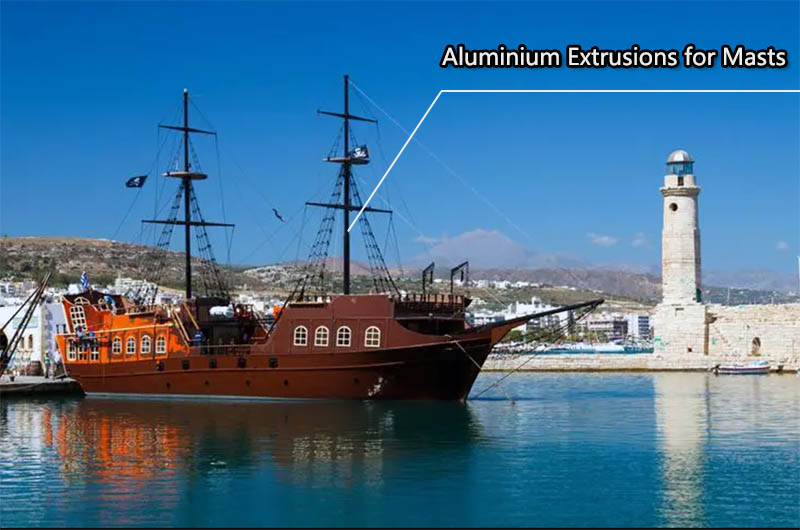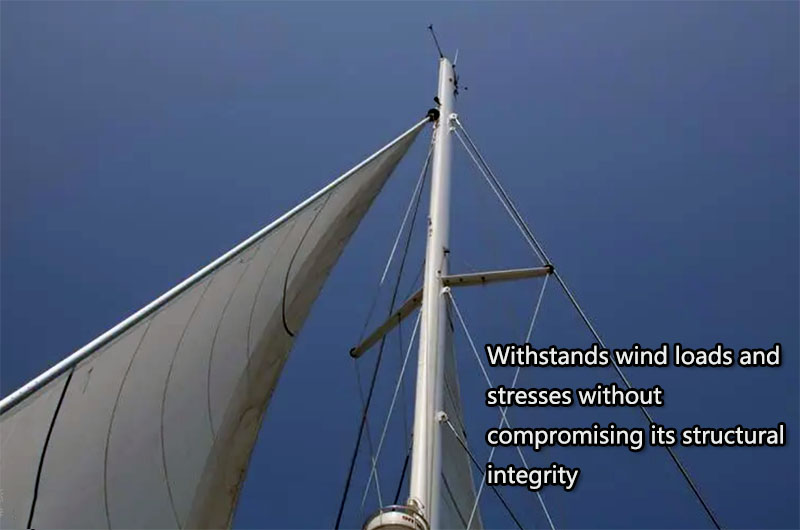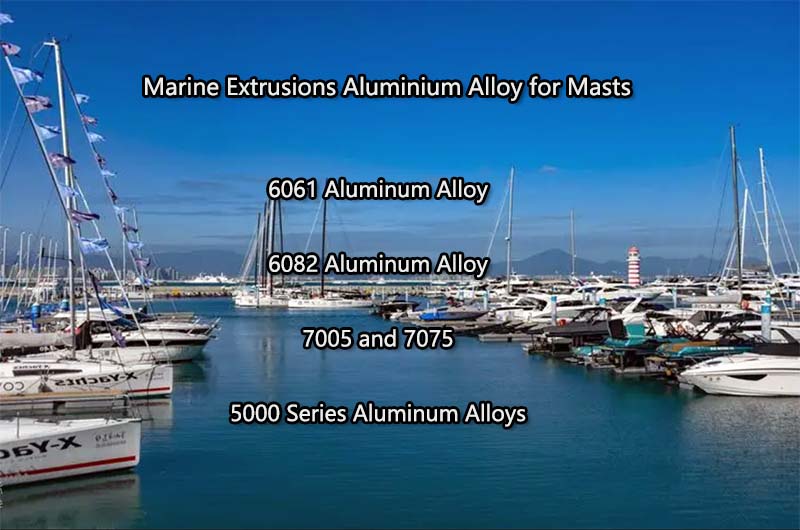Marine Aluminum Extrusions for Masts
Alloy: 6061/6082 High Strength
Masts are usually made of strong and durable materials such as wood, aluminum, or carbon fiber, depending on the size and type of boat.
Marine aluminum profiles are commonly used in the masts of various types of boats and sailboats. Extruded aluminum profiles offer several advantages for mast construction, including lightweight, corrosion-resistant, and high-strength properties.

Marine Aluminum Extrusions for Masts Properties
Here are some key considerations and benefits of using marine aluminum extrusions for masts:
- Lightweight: Aluminum profiles are much lighter than traditional mast materials such as wood or steel. The reduced weight helps improve the vessel's performance, agility, and responsiveness to wind conditions.
- Corrosion Resistance: Marine grade aluminum alloys, such as 6061 or 6082, have excellent corrosion resistance in marine environments. This is especially important for masts exposed to salt water and other harsh conditions.
- High Strength to Weight Ratio: Aluminum profiles provide high strength while maintaining a good strength to weight ratio. This allows the mast to withstand wind loads and stresses without compromising its structural integrity.
- Design flexibility: Aluminum profiles can be easily shaped, bent, and formed into various profiles and cross-sections to meet specific design requirements. This creates an aerodynamically efficient and aesthetically pleasing mast shape.
- Easy to assemble: Aluminum profiles can be pre-drilled with holes, slots, or grooves to make the assembly and assembly process easier. They can also be easily connected using fasteners, fittings, or welding techniques.
- Low Maintenance: Aluminum masts require less maintenance than other materials. They require no regular painting or surface treatment to prevent corrosion, reducing maintenance effort and cost over time.

Marine Extrusions Aluminum Alloy for Masts
The choice of aluminum alloy for a marine mast depends on various factors such as the size of the boat, mast design, desired strength-to-weight ratio, and environmental conditions. The following are several aluminum alloys commonly used in marine masts:
- 6061 Aluminum Alloy: This alloy is widely used in marine applications due to its excellent combination of strength, corrosion resistance, and weldability. It has good formability and can be easily shaped and processed.
- 6082 Aluminum Alloy: Similar to 6061, 6082 is a general purpose alloy for marine masts. It has high strength and good corrosion resistance and is often chosen for larger and more demanding sailboats.
- 7000 Series Aluminum Alloys: Alloys such as 7005 and 7075 in the 7000 series are known for their high strength and stiffness. These alloys are often used in high performance racing boats or large masts where extra rigidity is required.
- 5000 Series Aluminum Alloys: Alloys such as 5052 and 5083 are known for their excellent corrosion resistance and are suitable for use in marine environments. While they may not be as strong as 6000 or 7000 series alloys, they have good formability and are often used in smaller masts or in applications where corrosion resistance is critical.

NOTE: Mast design, including factors such as thickness, section shape, and reinforcement, also plays an important role in determining the appropriate aluminum alloy. It is advisable to consult a marine engineer, sail builder, or an experienced mast builder to select the most suitable aluminum alloy for specific requirements and intended use.
Marine Extrusions Aluminum Alloy for Masts Specifications
Specifications for marine extruded aluminum alloys for masts may vary depending on the specific requirements and intended use of the mast design. However, here are some general specifications for aluminum alloys commonly used in marine mast applications:
- Alloy: 6061 or 6082 (These are the aluminum alloys most commonly used for marine masts because of their balanced combination of strength, corrosion resistance, and weldability.)
- Condition: T6 (The T6 condition provides the best combination of strength and formability for marine mast applications.)
Mechanical Properties (Typical for 6061-T6 and 6082-T6):
| Property | 6061-T6 Alloy | 6082-T6 Alloy |
|---|---|---|
| Ultimate Tensile Strength | 310-360 MPa | 310-345 MPa |
| Yield Strength | 240-290 MPa | 260-310 MPa |
| Elongation | 12-17% | 10-12% |
- Corrosion Resistance: Alloys 6061 and 6082 both exhibit good corrosion resistance in marine environments. However, additional protective measures such as anodizing or coatings can be used to further enhance corrosion resistance.
- Dimensions: Dimensions of the mast's extruded aluminum profile may vary depending on the specific mast design and requirements. This includes the length, diameter, wall thickness, and cross-sectional shape of the mast section.
NOTE: These specifications are general guidelines only and specific requirements for marine mast profiles may vary depending on factors such as vessel size, mast design, sailing conditions and performance goals. Consultation with a marine engineer, sail builder, or mast supplier is recommended to determine the exact specifications for your particular mast application.
Recommended content you might be interested in
-
5083 Marine Aluminum Plate Sheet
We have ABS, BV, DNV, CCS, and other marine classification certifications, and a strict quality control system to ensure that 5083 marine aluminum sheets meet the required standards and specifications.
-
5086 Marine Aluminum Plate Sheet
We have ABS, BV, DNV, CCS, and other ship classification certifications. The 5086 ship plate is stable, corrosion-resistant, and can withstand harsh marine environments.
-
5052 Marine Aluminum Plate Sheet
We have ABS, BV, DNV, CCS, and other marine classification certifications, and a strict quality control system to ensure that 5052 marine aluminum sheets meet the required standards and specifications.
-
6082 marine aluminum plate is an aluminum alloy commonly used in marine applications. Like other marine-grade aluminum alloys, 6082 has a variety of properties that make it well suited for use in ships and other marine structures.
-
5754 marine aluminum plate is a deformed aluminum-magnesium alloy known for its excellent performance in the marine industry.
-
One of the key benefits of 5456 marine aluminum plate is its excellent corrosion resistance in saltwater and seawater environments. This resistance to salt water corrosion is critical to ensuring the longevity and structural integrity of marine components.
-
5383 aluminum alloy is commonly used in the construction of ships and other marine structures because they can withstand the harsh conditions of salt water and provide good structural integrity.
-
5454 aluminum plate exhibits excellent corrosion resistance, especially in marine environments. It effectively resists the corrosive effects of salt water and seawater, making it ideal for prolonged exposure to these conditions.
-
5059 marine grade aluminum plate meets specific industry or international standards, such as those set by American Bureau of Shipping (ABS), Det Norske Veritas (DNV), CCS or other organizations.
You might like the following content
-
6082 Aluminum Plate Sheet
6082 aluminum plate is known as the strongest alloy among the 6000 series alloys. 6082 aluminum is lightweight, easy to form, and can be strengthened through heat treatment.
-
6082 T6 Aluminum Plate Sheet
6082 T6 Aluminum Plate Sheet has stable performance and complete specifications and can be customized according to customer needs.
-
6082 T651 Aluminum Plate Sheet
We strictly control the quality of the 6082 T651 Aluminum Plate Sheet, ensuring that each sheet meets the highest industry standards, stable performance, and competitive price.
-
7075 Aluminum Plate Sheet
7075 is one of the strongest aluminum alloys available, with an excellent strength to weight ratio. 707 Aluminum Plate is ideal for highly stressed aircraft components.
-
7075 T6 Aluminum Plate Sheet
The 7075 T6 Aluminum Plate Sheet produced by us has a flat surface, smooth surface, no burrs, stable performance and competitive price.
-
7075 T651 Aluminum Plate Sheet
We have rich experience in producing 7075 T651 Aluminum Plate Sheet. The product has a flat surface and uniform thickness. The quality inspection meets the standards and the price is competitive.
-
5083 Aluminum Plate Sheet
5083 aluminum plate is a non-heat treatable alloy with high strength and corrosion resistance. We offer a wide range of sizes, thicknesses, and specifications at affordable prices to meet customer-specific needs.
-
5052 Aluminum Plate Sheet
5052 aluminum plate is mainly composed of magnesium and chromium. It has good processability, medium static strength, high fatigue strength, and good weldability. The fatigue strength of 5052 aluminum alloy is higher than most aluminum alloys.

